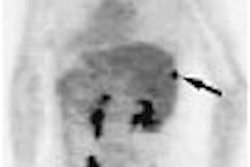Virtual colonoscopy may be a hot topic in British healthcare, but a patient’s chances of actually getting the exam through the U.K.'s National Health Service are limited, according to a newly published survey.
Nearly two-thirds of the 138 radiology departments responding to the nationwide survey said they couldn’t offer CT colonography in day-to-day clinical practice, according to a report published in the latest issue of Clinical Radiology (January 2004, Vol. 59:1, pp. 39-43).
Competing clinical demands, lack of training in VC technique, and financial restrictions were the primary reasons given for not routinely offering CT colonography, wrote the researchers from the Intestinal Imaging Centre at St. Mark’s Hospital in London.
"CT scanner capacity is limited in the United Kingdom, and furthermore, it is generally accepted that CT colonography is both difficult to interpret and time-consuming," wrote the researchers, led by radiologist Dr. Steve Halligan. "However, it has attracted a great deal of professional and public attention with the result that there is considerable pressure on departments to provide it on a day-to-day basis."
Yet even among the 50 facilities that reported offering VC on a routine basis, more than a third performed less than one procedure per month, and only six performed more than 300 VC exams per year. The higher exam rates are also far below the average numbers of barium enemas performed each year at U.K. facilities, the authors noted.
The relatively common use of barium enema examinations in Britain also factored into the indications for CT colonography among the 50 facilities performing the procedure.
Failed barium enema was often an accepted indication for subsequent VC. The virtual exam was also indicated as an alternative to barium enema in frail or immobile patients in 74% of the departments, while incomplete colonoscopy was an indication in 78%.
Another factor distinguishing British usage of, and techniques for, CT colonography: as opposed to the American experience, VC in the U.K. is used less as a screening exam and more with symptomatic patients, the authors noted.
"The majority of U.K. departments (60%) used intravenous contrast medium, a procedure that is relatively unusual in the literature and which probably reflects the symptomatic nature of U.K. practice," the authors wrote, adding that contrast media aids interpretation of extra-colonic pathology and enables better staging of any primary colorectal cancer.
In other technical findings, 92% of the facilities performing VC used full bowel preparation in advance, and 90% used both prone and supine positioning for the scans. The vast majority (84%) used air insufflation of the colon, while 16% used carbon dioxide.
CT colonography was performed by gastrointestinal radiologists in 64% of the 50 departments, by CT specialists in 26%, and by both groups in 10%. Radiologists also reviewed exams handled by radiographers or nurses at 36% of the 50 facilities.
The survey was sent to the 216 National Health Service radiology departments identified in a Royal College of Radiologists database as having an adult gastrointestinal radiological service, the authors wrote. The 138 replies received constituted a 64% response rate.
In another study published this month, Australian researchers found that slightly more people in that country were willing to undergo colorectal screening with VC than responded to previous campaigns promoting fecal occult blood testing and flexible sigmoidoscopy (Radiology, February 2004; Vol. 230:2, pp. 459-464).
By Tracie L. ThompsonAuntMinnie.com staff writer
February 16, 2004
Related Reading
Harvard rads urge more studies to bolster CT colonography, January 22, 2004
Experience sharpens role of IV contrast-enhanced VC, January 19, 2004
Lower cardiovascular risk makes virtual colonoscopy safer, study finds, December 31, 2003
Results suggest important new cancer staging role for virtual colonoscopy, December 19, 2003
Research nudges virtual colonoscopy toward wider use, September 12, 2003
Copyright © 2004 AuntMinnie.com




















